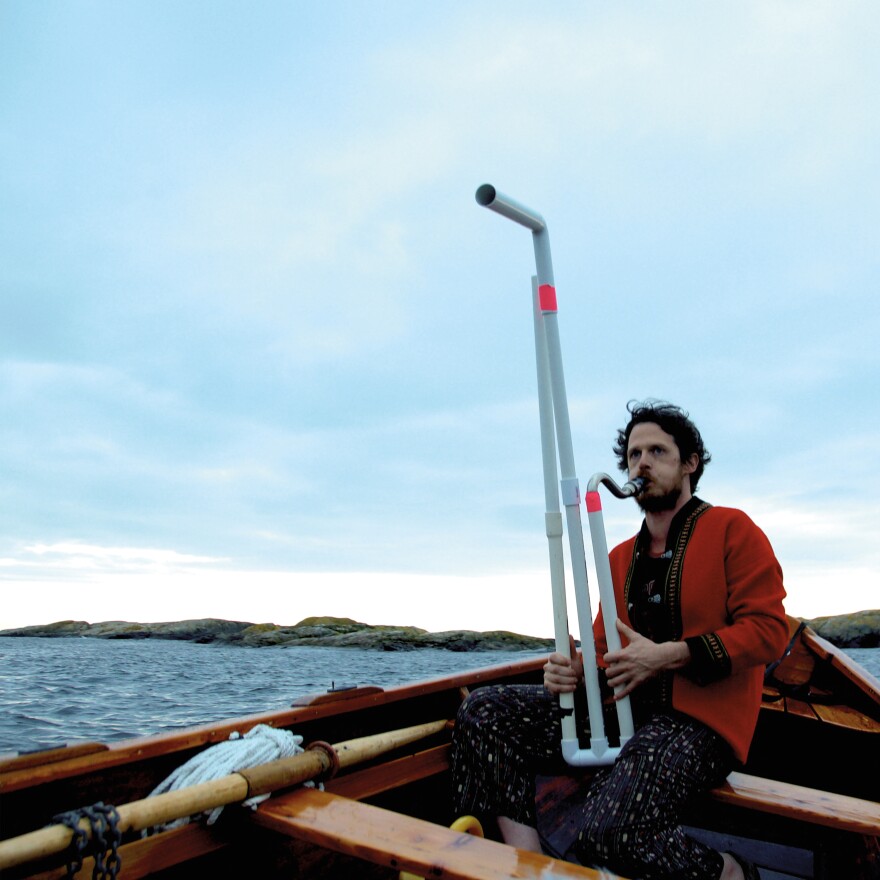In a former industrial building in Florence, Massachusetts — near jewelry designers, a T-shirt maker and a school devoted to archery — is Feeding Tube Records, a record store and label specializing in what the owners characterize as “weird music.”
Whether it’s psychedelic rock, solo guitar, noise, experimental jazz or musical explorations that defy categorization, it may have a home on Feeding Tube.
Ted Lee founded Feeding Tube in 2005, when he was a college student, as a vehicle to release his own music.
“It was just a place to focus my art and creativity and things I was doing in Hampshire [College],” Lee said. “I kind of just walked into a record label and a record store.”
Byron Coley, a poet and longtime music writer, had experience running another label with Thurston Moore, from the band Sonic Youth. Meeting Lee led to a collaboration that grew into what Feeding Tube is today.

“Thurston and I had been doing records, but we were running out of the energy to do it,” Coley said. “Ted had a lot of energy. So it became more of a collaborative effort. Ted has his projects. We had our projects. And then they all sort of eventually grew together.”
Releasing recordings by artists that Lee refers to as “operating on the edge of obscurity” is what makes Feeding Tube unique.
“I’ve seen hundreds and thousands of records that I wish existed,” Lee said. “This is why I always wanted to do Feeding Tube — make the records that you want out there. It’s living your dream.”
For Coley, that dream is working with independent artists making distinctive music in a variety of genres.
“Handmade objects, or objects that have a quality of having been touched by the artist, or some other human in the course of their production, is always interesting to me,” Coley said. “I was always interested in finding records with paste-on covers, or just a homemade-ness to them even if the music wasn’t that interesting. You knew this had not gone through 100 marketing guys’ hands before it got to the public.”
It’s this do-it-yourself quality that Coley always wanted in his own label.
“I admired the process, because that, to me, spoke a lot about the intention behind the music — and it was artistic,” he said. “It was to get something out there, not to make a million bucks.”
In an era of digital downloads, Feeding Tube remains pretty old-school, with a focus on vinyl.
“Vinyl is just an attractive medium, and it’s archival in a way that makes it seem like if you have a record, and you take some sort of care of it, it’s a substantial thing that’ll last for a very long time,” Coley said.

Feeding Tube does small pressings of around 250 to 500 records. Coley said that even with those small numbers, the economics can work.
“You can make your money back if you do enough direct mail order, and you have distribution — and we have pretty good distribution,” he said. “We can we can sell out on pre-orders. By the time the record has its official release date, we’re basically out of copies, and have to re-press.”
In the 15 years since Lee’s first record, Feeding Tube has released over 500 titles. In 2019, they put out 64, and this year, the plan is to release a record every week — a pace they are keeping up even during the pandemic.
Coley said it’s really important to maintain such an active release schedule.
“To create a profile, you need to have a decent number of records available, so that you actually have some kind of a footprint that people recognize,” he said. “And the more records you put out, the more attention the distributor will pay to the individual releases — because if you’re doing 50 records a year, they are a lot more interested in trying to sell, because you’re going to have some that are going to be popular.”

For Lee, success is working with a roster of independent artists.
“I always wanted to work with Cherry Blossoms and Josephine Foster, Eugene Chadbourne, we always wanted to work with, and Michael Hurley and Mars,” Lee said. “The most personal ones that no one likes — those are probably some of my favorite records. ”
For recordings by local musicians Willie Lane and Wednesday Knudsen, or a reissue of Owen Maercks’s debut record from the late 1970s, or Arrington de Dionyso — an Australian who plays a series of PVC pipes while floating in a boat — Feeding Tube is where you’ll find them.
“We think the world should have more weird records,” Coley said.
During the pandemic, Feeding Tube is hosting QuaranTunes, a series of online performances featuring Byron Coley reading poetry and performances by artists on the label.
Featured Music in order of appearance:
- Wednesday Knudsen & Willie Lane: “Trillium” from Long Time ‘Till Tomorrow (FTR530)
- Mako Sica / Hamid Drake: “Enchanted City” from Balancing Tear (FTR513)
- Joseph Allred: “What Faulkner Saw” from Michael (FTR532)
- Iloyd Thayer & Jerome Deupree: “Funeral Song for Rammellzee” from Duets (FTR406)
- Arrington de Dionyso: “Icarus and the Blues” from Shouting Over Deep Water Blues (FTR503)
- Owen Maercks: “Wild Time” from Kinds of Blue (FT478)









